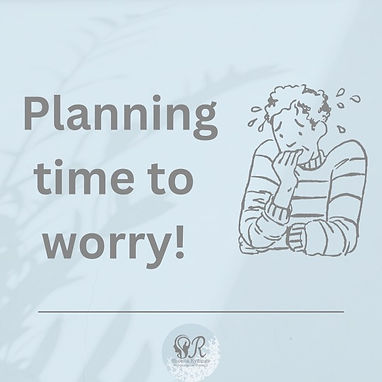“But what if”… Sound familiar?
You are not on your own! Almost 1 in 10 people find uncontrollable worrying distressing. It can affect your mood; it can also have significant impact on your personal relationships, work and social life.
Worrying is completely normal, we all do it from time to time. It can be actually beneficial on some occasions. It can help us identify potential problems and then lead us to be able to problem solve these. But excessive and persistent worry can be problematic.
Worry itself involves negative thought patterns, these become habits and we end up thinking in this way repeatedly. These thought patterns can then become ingrained in our brains and become our most favoured way to think, even though it is unhelpful – it is just habit. So stopping worrying isn’t easy.
A lot of people begin trying to manage their worries by simply trying not to worry, or trying not to think about it. However, the problem here is that the harder we try not to think about something, the more we end up thinking about it.
For example, if I said to you don’t think about pink elephants…..

What has happened? Have you managed not to think about them, or have lots of images and words of pink elephants been in your mind? This is because simply trying not to think about it only focuses our attention on the thing we don’t want in our minds. Therefore, we think about it more. If this is something worrying, worrying thoughts can snowball and we end up thinking about a worst case scenario.
Worry time is a technique I often use in therapy. It is a really helpful tool where you’re not required to NOT think about the worry, but to simply acknowledge where your mind has gone, note it down and tell your mind you will be thinking about it later.
Postpone the worry until later
 Worry time is designed to help you reduce the amount of time you spend worrying and gives you some control over the worrying thoughts, rather than the worrying thoughts having control over you!
Worry time is designed to help you reduce the amount of time you spend worrying and gives you some control over the worrying thoughts, rather than the worrying thoughts having control over you!
Tips to engage in worry time strategy:
1- Set aside some time in the day. Approx 15-30 minutes for the worry time, try not to spend longer than 30 minutes. Set a timer to make sure you don’t go over this time. You can try doing this twice a day at first if this is helpful. Try writing it down, planning it into your calendar. Try not to have the time slot too close to bed time, perhaps around 6pm is a good time slot as means you have time after this to decompress and relax before bed.
2- The time around your allocated time slot is where the real skill takes place. When ever you notice a worrying thought pop into your mind, acknowledge the worry and perhaps write it down but then postpone thinking about it until your designated worry time. This is where the real skill and test is, as postponing the worrying thought is where the change is happening, you’re changing the habit of thinking about every worrying thought that enters your mind, to postponing it until you choose. So be aware, it may not be easy!!
3- When it comes to your worry time, now is time to address your worries. Get out your phone or diary where you have noted them down and ask your self a few questions.
- Is this a hypothetical worry or a real current problem?
- Is this something you have control over?
- If so, try problem solving, looking at solutions OR plan in a time to do this
- If it is not, then try letting the worry go.
Try using the worry tree below to help you during your worry time.

4- Once your worry time is over, change your focus of attention to something more enjoyable and meaningful. And remember, as soon as another worry pops into your mind… write it down and postpone until later.
Remember, practice and you will see progress and a reduction in anxiety, leading you to feel more in control of your worries, anxiety and life!!
If you need any support with worrying, anxiety and mood related difficulties please do get in touch and we can chat about how I can help you.



